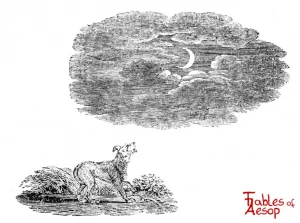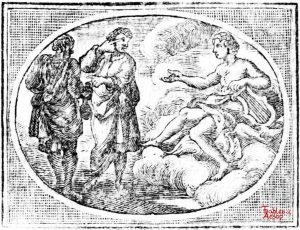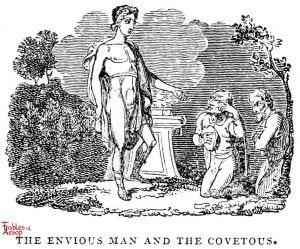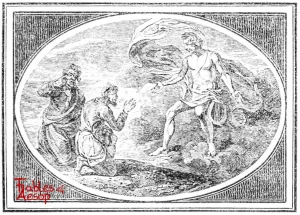Greed and Jealousy in neighbors caused one to be granted twice what the other asked for. One asked for treasure but the other asked that one eye be blinded.
Vices are their own punishment.

Eliot/Jacobs Version
Two neighbours came before Jupiter and prayed him to grant their hearts’ desire. Now the one was full of avarice (greed), and the other eaten up with envy (jealousy). So to punish them both, Jupiter granted that each might have whatever he wished for himself, but only on condition that his neighbour had twice as much. The Avaricious man prayed to have a room full of gold. No sooner said than done; but all his joy was turned to grief when he found that his neighbour had two rooms full of the precious metal. Then came the turn of the Envious man, who could not bear to think that his neighbour had any joy at all. So he prayed that he might have one of his own eyes put out, by which means his companion would become totally blind.

JBR Collection (The Envious Man and The Covetous)
Two Men, one a Covetous fellow, and the other thoroughly possessed by the passion of envy, came together to proffer their petitions to Jupiter. The god sent Apollo to deal with their requests. Apollo told them that whatsoever should be granted to the first who asked, the other should receive double. The Covetous Man forbore to speak, waiting in order that he might receive twice as much as his companion. The Envious Man, in the spitefulness of his heart, thereupon prayed that one of his own eyes might be put out, knowing that the other would have to lose both of his.

Samuel Croxall (The Envious Man and the Covetous)
AN envious Man happened to be offering up his prayers to Jupiter, just in the time and place with a covetous miserable fellow. Jupiter, not caring to be troubled with their impertinences himself, sent Apollo to examine the merits of their petitions, and to give them such relief as he should think proper. Apollo therefore opened his commission, and withal told them, that, to make short of the matter, whatever the one asked the other should have it double. Upon this, the covetous Man, though he had a thousand things to request, yet forbore to ask first, hoping to receive a double quantity; for he concluded, that all men’s wishes sympathized with his. By this means, the envious man had no opportunity of preferring his petition first, which was the thing he aimed at; so, without much hesitation, he prayed to be relieved, by having one of his eyes put out; knowing that, of consequence, his companion would be deprived of both.
THE APPLICATION
In this fable, the folly of those two vices, envy and avarice, is fully exposed, and handsomely rallied. The miser, though he has the riches of the world, without stint, laid open to his choice, yet dares not name the sum, for fear another should be richer than himself. The advantage of a double quantity, by receiving last, is what he cannot bear to lose, and he fares accordingly. The envious man, though he has a power of calling for good things, without measure, to himself or others, yet waves this happy privilege, and is contented to punish himself by a very great loss, even that of an eye, that he may bring down a double portion of the like calamity upon another. These are the true tempers of the covetous and envious; one can scarce determine whether they are more mischievous to themselves, or to the public; but it is manifest, that they are highly noxious to both, and should be treated accordingly.

Thomas Bewick (The Envious Man and The Covetous)
An Envious Man happened to be offering up his prayers to Jupiter, at the same time and in the same place with a covetous miserable Fellow. Jupiter sent Apollo to examine the merits of their petitions, and to give them such relief as he should think proper. Apollo therefore opened his commission, and told them, that to make short of the matter, whatever the one asked, the other should have doubled. Upon this, the Covetous Man, who had a thousand things to request, forebore to ask first, hoping to receive a double quantity; for he concluded that all men’s wishes sympathized with his own. By this means, the Envious Man had the opportunity of giving vent to his malignity, and of preferring his petition first, which was what he aimed at; so without hesitation he prayed to have one of his eyes put out, knowing that of consequence his companion would be deprived of both.
APPLICATION.
This Fable is levelled at two of the most odious passions which degrade the mind of man. In the extremes of their unsocial views, envy places its happiness in the misery and the misfortunes of others, and pines and sickens at their joy; and avarice, unblest amidst its stores, is never satisfied unless it can get all to itself, although its insatiable cravings are at once unaccountable, miserable, and absurd.


Avarus et Invidus
Avarus et invidus orabant Iovem; Apollo mittitur ut eorum votis satisfiat. Qui utrique dat liberam optandi facultatem, hac conditione ut quodcumque alter petiisset, alter idipsum acciperet duplicatum. Haeret diu avarus petitque non pauca, et duplum accepit socius. Invidus tandem hoc petivit ut ipse uno privetur oculo, laetus socium mulctandum esse utroque.
Moral
Avaritiam nihil satiare potest, at invidia nihil est dementius quae, dummodo alteri noceat, sibimetipsi imprecatur malum.
Perry #580


